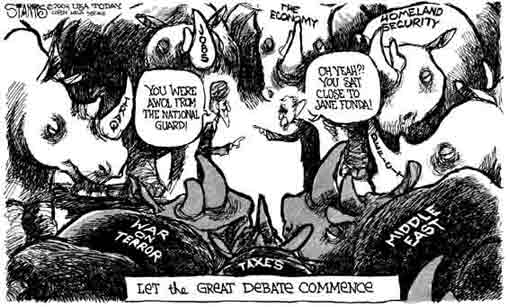

 "When
the people are
"When
the people are
well informed,
they can be trusted
with their own
government."
-Thomas Jefferson
The Great Debate
It is crucial to understand your concept of democracy and its role in our lives. This need stems from this fact: the way you view your government will directly affect the amount of power you allot to that government as well as how that government should utilize its power. Moreover, this power has the potential to permeate every facet of your life: your freedom, your security, your equality, your privacy, your participation, and even your ability to vote. What's more, the internet may or may not soon become a tool through which the government can affect your freedom, your security, your privacy, your participation and even your ability to vote. This is why understanding your view of democracy is so crucial--because your perception of the government's role directly affects your perception of the internet and its purpose.
So let's explore direct democracy, representative democracy and the implications these goverments have for carry for their citizens.
Direct Democracy: What, How and Why
What is it?
"Pure" Democracy. A government in which power is applied through majority rule by the people rather than through representatives. A direct democracy allows for a literal one citizen, one vote, by allowing citizens to yea or nay on every political issue.
How does it work?
Direct democracy could be created with a constitutional amendment establishing nonpartisan direct democracy by means of secure, interactive voting networks connected to voter's homes, via the internet.
Why is it effective?
Advocates of direct democracy believe it would restore the sovereignty of the people. The voters would be truthfully and fully informed about issues and government. The people would decide what is important to them, rather than having partisan politics, special interests, moneyed interests, unreliable polls and the news media making those decisions. The voters would be able to communicate between themselves and with their elected representatives. No campaign financing. Elected professional government managers would be the most qualified. More voters would participate in democracy as they would share the "front row seat" in deciding public policy.
The Direct Democracy Manifesto: like the Communist Manifesto, except an advocate for democracy.

Representative Democracy: What, How and Why
What is it?
A Republic. A government in which elected officials stand or act for the people through delegated authority; a government in which the people are represented by persons chosen from among them by election.
How does it work?
Why is it effective?
Staggered executive and legislative elections and electoral terms of varying lengths ensured an appropriate level of democratic participation while guarding the nation against extreme shifts in the mood of the people. With a third of the Senate selected at each election of the House of Representatives, and the President chosen every other election, extreme popular movements tend not to translate directly into extreme political power. The two-year terms in the House enables the voice of the people to translate regularly into political power. The resulting political stability has engendered unparalleled economic development and helped drive us to world leadership.
Implications: Assumptions and Responsibilities
What are the assumptions involved in these two governments?
What are the responsibilities required of citizens?
Americans and Government: Conflicted or Consistent?
At a very general level, Americans are in agreement. They want better schools, better health care, better highways. But there is disagreement over how to achieve these general goals, how to prioritize expenditures, and whether to raise taxes to pay for them--in essence, disagreement over which type of government is more effective. The more specific the issue becomes, the greater the disagreement. It is easy to believe that most people agree because we live in relatively homogeneous political communities or deal with people who tend to be politically alike. In the nation at large, however, there is sharp disagreement on issues such as abortion, guns, the death penalty, and gay rights, to name only a few.
For example, a poll in USA TODAY showed that in Montclair, New Jersey, about 75 percent of residents agreed on a number of major issues and in Franklin, Tennessee about the same proportion agreed. But the residents of Montclair and Franklin agreed in opposite directions. If nothing else, close and sharp division between Republicans and Democrats at the national level and in many of the states attests to the division in the ranks of Americans.